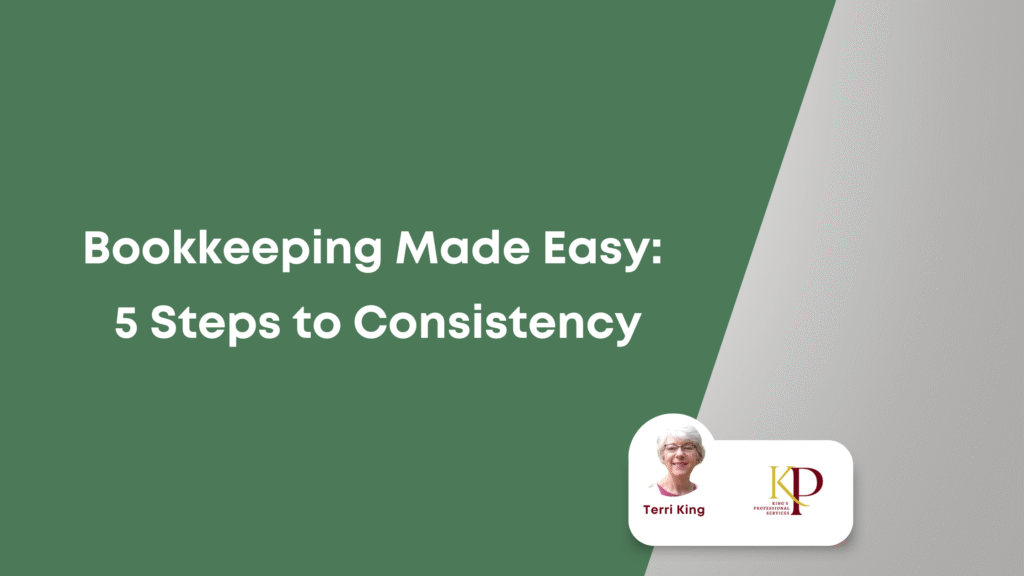Sharing is caring!
Have you ever opened your financial records and thought, “Where do I even start?”
And then just closed the book and walked away?
If so, you’re not alone. Small business books often look more like a scavenger hunt—receipts hiding in bags, invoices lost in files, and bank statements left unopened for weeks.
Here’s the good news: you don’t have to live in bookkeeping chaos. Standardizing your process can transform your financial recordkeeping from a headache into a tool that actually helps you run your business.
Why Standardization Matters
When your bookkeeping is consistent, your financial reports stop being guesswork and start being reliable. A standardized process saves you time, reduces costly errors, and gives you a clear view of your business health.
Without it? You’re left with confusion, stress, and possibly even penalties if deadlines or compliance requirements slip through the cracks.
So, ask yourself: Can I honestly make sound decisions about my business if my numbers aren’t organized?
5 Steps to Standardize Your Bookkeeping
1. Create a Chart of Accounts
Think of this as your financial map. Income, expenses, assets, liabilities—everything should have its place. Don’t overcomplicate it, but make sure categories are clear and used consistently.
Ask yourself: Am I using the same categories month after month, or does it change depending on my mood?
2. Set a Bookkeeping Schedule
Your books don’t get done by accident. Put bookkeeping on your calendar just like you would a client meeting.
- Daily: record transactions or capture receipts
- Weekly: reconcile accounts
- Monthly: review financial reports
Ask yourself: If I don’t schedule this, when will it realistically get done?
3. Use the Right Tools
Stop relying on random spreadsheets that only you understand. Cloud-based accounting software with automation features can save you hours and reduce mistakes.
Ask yourself: Am I working harder than I need to because I haven’t invested in the right system?
4. Document Your Process
Create a simple standard operating procedure (SOP) for your books. Even if you’re the only one doing the work, documenting your steps ensures consistency. And if you ever hand it off, training someone else becomes so much easier.
Ask yourself: Could someone step in tomorrow and understand how my books are organized?
5. Review and Adjust Regularly
Your business will grow, and your bookkeeping system should grow with it. Take time each month to review your reports, look for patterns, and make small improvements.
Ask yourself: Am I reviewing my numbers often enough to actually use them for decision-making?
Mistakes to Avoid
- Mixing personal and business accounts
- Waiting until tax season to “catch up”
- Overcomplicating categories
- Ignoring reconciliations
Sound familiar?
Don’t worry—most small business owners have been guilty of at least one of these. The point is to recognize it and move forward with a better system.
The Payoff of Standardization
When you commit to standardizing your bookkeeping:
- You gain clarity—no more wondering where your money went.
- You build confidence—you can make decisions with reliable data.
- You ensure compliance—no last-minute scrambling at tax time.
- You create scalability—your systems grow as your business grows.
Isn’t that the kind of financial foundation every small business owner deserves?
Your Next Steps
Here’s how you can start today:
- Pick one area of your books that feels the most disorganized.
- Create a simple step to bring consistency (for example, schedule 30 minutes this week to reconcile one account).
- Repeat the process until your entire system feels organized and manageable.
The truth is you don’t need to do everything at once. Start small and keep moving toward a standard process.
Let’s Connect
Your bookkeeping should be a tool that helps you grow, not a burden that keeps you up at night. If your current process feels overwhelming or inconsistent, it may be time to get some help.
I work with small business owners just like you to create bookkeeping systems that are consistent, clear, and reliable. If you’re ready to stop wrestling with your numbers and finally gain financial clarity, let’s connect—I’d love to talk about how we can standardize your process together.

